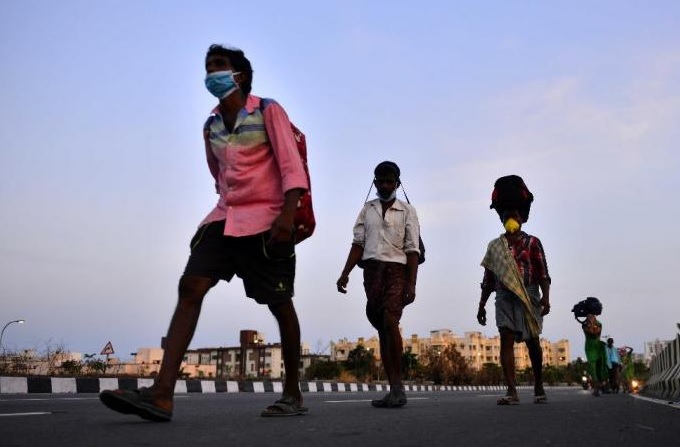
Photo credit: PIB
The Association of Indian Muslims of America sends donations to a number of Indian NGOs supporting migrant laborers.
The Indian American Association of Indian Muslims of America, a Washington, DC, -based nonprofit, is supporting nonprofits in India that are helping unemployed migrant laborers transition back to their villages.
Kaleem Kawaja, Executive Director of the Association of Indian Muslims of America in Washington, DC, said AIM originally started its fundraising campaign to help the victims of Delhi riots, predominantly in low-income Muslim communities in the Indian capital in late February.
However, AIM recently expanded its campaign to include providing relief to thousands of migrant workers suddenly unemployed, regardless of their religious background, in the wake of the Covid pandemic in March, he said.
Beginning in mid-April, the nonprofit has sent donations to several prominent India-based nonprofits. Kawaja said AIM’s fundraising campaign was helped by the advent of the Islamic holy month of Ramadan in late April, as Islam places special emphasis on charity during Ramadan.
Some of the nonprofits in India to whom AIM has sent donations for the purpose of providing food and shelter to unemployed migrant laborers include:
– The Socialist Party, in Lucknow and several districts in Uttar Pradesh
– Aman Biradari, in Delhi and several districts in Haryana and Uttar Pradesh
– Hindus for Human Rights, in Cochin and other districts in Kerala and Tamil Nadu
– Goonj, in Delhi and several districts in north India
– Pol-Pan, in Khambatt, Gujarat
– Association for India’s Development, in College Park, MD. AID has several chapters in Uttar Pradesh, Bihar and Andhra Pradesh.
Kawaja said AIM plans to continue its current fundraising campaign for the rest of the year, to provide further relief to the thousands of migrant laborers who have been rendered jobless.
When Prime Minister Modi announced a nationwide lockdown, with a four-hour notice, on the night of March 25, more than a hundred million migrant laborers became unemployed in cities across India.
These workers and their families, including women and children, were seen assembling in hundreds of thousands to return to their homes in faraway villages, mostly from rural areas of Uttar Pradesh, Bihar, Madhya Pradesh and West Bengal. Many walked hundreds of miles to their villages.
“The only relief for these laborers were many good Samaritans who in several instances loaded them on their trucks and vans to transport them, or small charitable non- governmental- organizations that provided free food rations or cooked meals to them,” said Kawaja. “Many of the NGOs that we are supporting now distributed free food in the low-income localities in cities and cooked meals on the highways or in parks in cities.”
Kawaja also appealed to all Indian American organizations to similarly provide financial help to Indian nonprofits that are working with Covid victims.
In the past, AIM had raised funds in the United States to help relief efforts by India-based NGOs during other emergencies. Some examples include: the catastrophic floods in Kerala, 2018; a tsunami in Tamil Nadu, 2005; an earthquake in Gujarat, 2001; a cyclone in Orissa, 1998.
